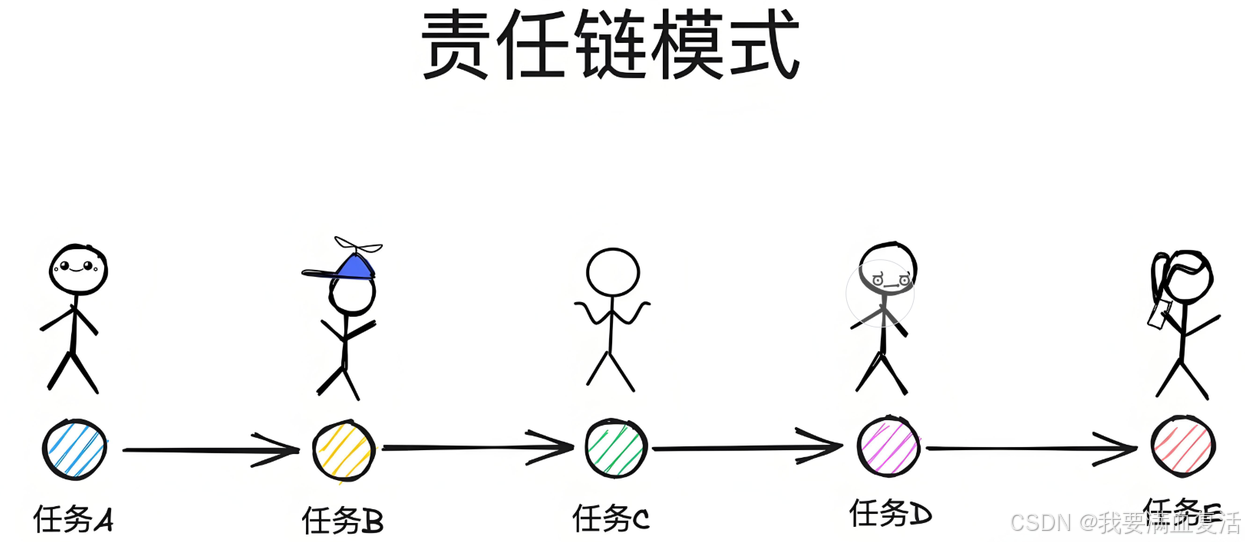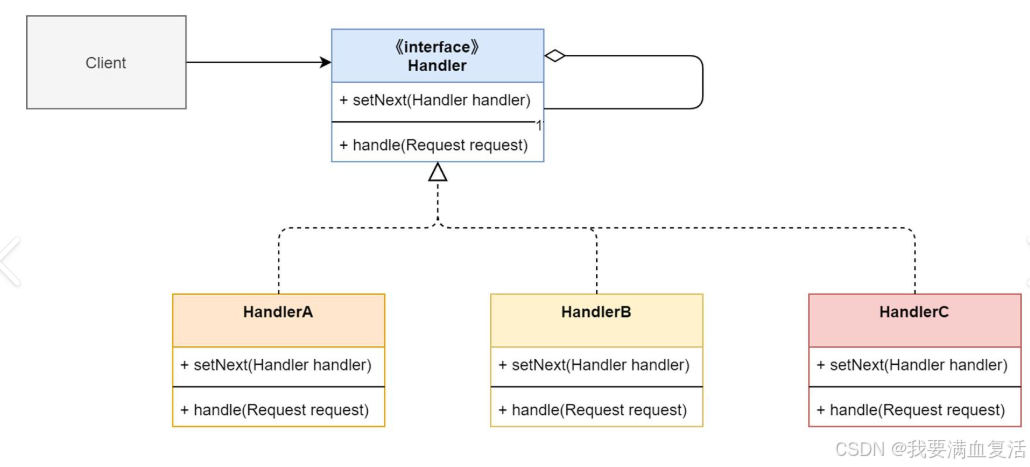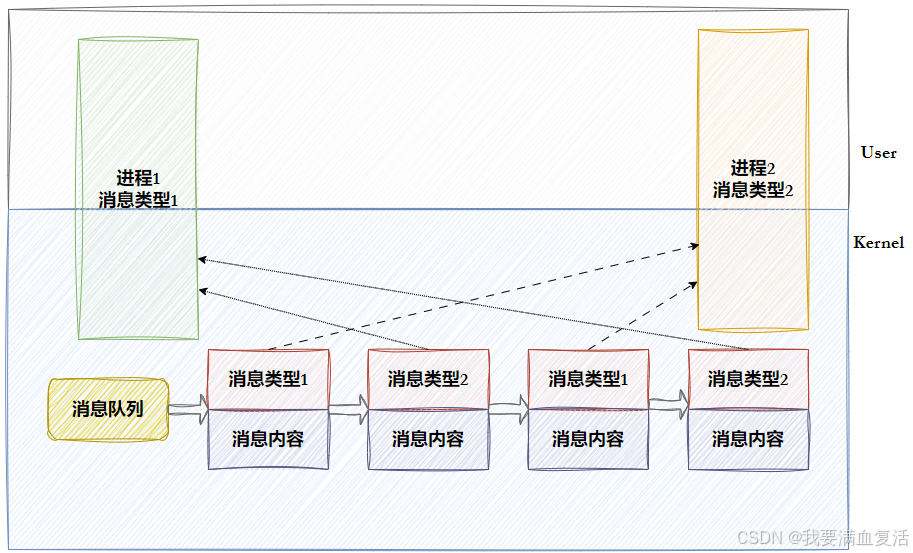概念
消息队列是一种以消息为单位的进程间通信机制,允许一个或多个进程向队列中发送消息,同时允许一个或多个进程从队列中接收消息。消息队列由内核维护,具有以下特点:
-
异步通信:发送方和接收方不需要同时运行,消息会存储在队列中。
-
消息优先级:支持消息的优先级排序。
-
消息分类:每条消息都有一个类型,可以根据类型选择性地接收。
-
持久性:即使发送方或接收方意外退出,消息仍然保留在队列中。
内核结构
在 /usr/include/linux/msg.h 中,可以查看到消息队列的结构如下:
struct msqid_ds {
struct ipc_perm msg_perm;
struct msg msg_first; / first message on queue,unused */
struct msg msg_last; / last message in queue,unused */
__kernel_time_t msg_stime; /* last msgsnd time */
__kernel_time_t msg_rtime; /* last msgrcv time */
__kernel_time_t msg_ctime; /* last change time */
unsigned long msg_lcbytes; /* Reuse junk fields for 32 bit */
unsigned long msg_lqbytes; /* ditto */
unsigned short msg_cbytes; /* current number of bytes on queue */
unsigned short msg_qnum; /* number of messages in queue */
unsigned short msg_qbytes; /* max number of bytes on queue */
__kernel_ipc_pid_t msg_lspid; /* pid of last msgsnd */
__kernel_ipc_pid_t msg_lrpid; /* last receive pid */
};其中 struct ipc_perm 是 System V IPC(进程间通信)机制中用于描述 IPC 对象(如消息队列、信号量集或共享内存段)权限和所有者信息的数据结构。它定义了谁可以访问和操作这些 IPC 资源,以及它们的访问权限,其中该结构体位于 /usr/include/linux/ipc.h 内,定义如下:
struct ipc_perm {
key_t __key; /* Key supplied to xxxget(2) */
uid_t uid; /* Effective UID of owner */
gid_t gid; /* Effective GID of owner */
uid_t cuid; /* Effective UID of creator */
gid_t cgid; /* Effective GID of creator */
unsigned short mode; /* Permissions */
unsigned short __seq; /* Sequence number */
};接口说明
以下函数均包含在头文件 <sys/ipc.h> 和 <sys/msg.h> 中
msgget
功能:调用创建或获取一个消息队列
int msgget(key_t key, int msgflg);-
key:唯一标识消息队列的键值,通常通过 ftok 函数生成。
我们可以看到 key 的类型为 key_t,实际上也是一个整数,不过要保证其数值的唯一性,要获取该参数 key 我们需要使用 ftok 函数,它会根据一个文件路径和一个项目标识符(proj_id)通过一系列算法生成一个几乎唯一的键值。
- pathname 是一个指向存在的文件路径的指针,实际上可以随便写。
- proj_id 是一个整数,通常是一个字符常量,其低8位被用于生成键值,实际上可以随便写。
-
msgflg:指定消息队列的权限和行为,由九个权限标志构成,它们的用法和创建文件时使用的mode模式标志是一样的。
其中最为常用的shmflg如下:
- IPC_CREAT:如果共享内存段不存在,则创建一个新的共享内存段,存在则返回 shmid。
- IPC_EXCL:与IPC_CREAT一起使用时,确保创建新的共享内存段,如果共享内存段已存在则失败。
- 权限位:shmflg的低9位用于设置共享内存段的权限,与文件系统的权限位相同。
#include <sys/ipc.h>
#include <sys/msg.h>
#include <iostream>
using namespace std;
int main()
{
key_t key = ftok("/home/lbk/lesson27/test.cc", 8888);
int msgid = msgget(key, IPC_CREAT);
return 0;
}msgsnd
功能:用于向消息队列中发送消息。
int msgsnd(int msqid, const void *msgp, size_t msgsz, int msgflg);参数
-
msgid:消息队列的 ID(由 msgget() 返回)。
-
msgp:指向消息结构的指针。消息结构的第一个字段必须是
long类型,表示消息类型,如下。
struct msgbuf {
long mtype; /* message type, must be > 0 */
char mtext[1]; /* message data */
};
// 以⼀个long int⻓整数开始,接收者函数将利⽤⽤这个⻓整数确定消息的类型-
msgsz:消息的大小(不包括消息类型字段)。
-
msgflg:标志位,常用值:
-
0:阻塞模式,直到消息被发送。
-
IPC_NOWAIT:非阻塞模式,如果队列已满,立即返回。
-
返回值
-
成功时返回
0。 -
失败时返回
-1并设置errno。
#include <sys/ipc.h>
#include <sys/msg.h>
#include <iostream>
using namespace std;
struct msg_buffer
{
long msg_type;
char *msg_text;
};
int main()
{
key_t key = ftok("/home/lbk/lesson27/test.cc", 8888);
int msgid = msgget(key, IPC_CREAT);
msg_buffer sendbuf = {1, "hello world!"};
msgsnd(msgid, &sendbuf, sizeof(sendbuf.msg_text), 0);
return 0;
}msgrcv
功能:用于从消息队列中接收消息。
ssize_t msgrcv(int msqid, void *msgp, size_t msgsz, long msgtyp, int msgflg);参数
-
msgid:消息队列的 ID。
-
msgp:指向消息结构的指针。
-
msgsz:消息的最大接收大小(不包括消息类型字段)。
-
msgtyp:指定接收的消息类型:
-
0:接收队列中第一个消息。 -
>0:接收指定类型的消息。 -
<0:接收类型小于等于该值的最小类型消息。
-
-
msgflg:标志位:
-
0:阻塞模式,直到消息可用。
-
IPC_NOWAIT:非阻塞模式,如果队列为空,立即返回。
-
返回值
-
成功时返回实际接收的消息大小。
-
失败时返回
-1并设置errno。
#include <sys/ipc.h>
#include <sys/msg.h>
#include <iostream>
using namespace std;
struct msg_buffer
{
long msg_type;
char *msg_text;
};
int main()
{
key_t key = ftok("/home/lbk/lesson27/test.cc", 8888);
int msgid = msgget(key, IPC_CREAT);
msg_buffer sendbuf = {1, "hello world!"};
msgsnd(msgid, &sendbuf, sizeof(sendbuf.msg_text), 0);
msg_buffer receivebuf;
msgrcv(msgid, receivebuf.msg_text, 1024, 2, 0);
cout << receivebuf.msg_text << endl;
return 0;
}msgctl
功能:用于对消息队列进行控制操作,如获取状态、设置属性或删除队列。
int msgctl(int msqid, int cmd, struct msqid_ds *buf);参数
-
msgid:消息队列的 ID。
-
cmd:指定操作命令:
-
IPC_STAT:获取消息队列的状态信息,存储到buf中。 -
IPC_SET:设置消息队列的权限和属性。 -
IPC_RMID:删除消息队列。
-
-
buf:用于存储或修改消息队列的状态信息。
返回值
-
成功时返回
0。 -
失败时返回
-1并设置errno。
#include <sys/ipc.h>
#include <sys/msg.h>
#include <iostream>
using namespace std;
struct msg_buffer
{
long msg_type;
char *msg_text;
};
int main()
{
key_t key = ftok("/home/lbk/lesson27/test.cc", 8888);
int msgid = msgget(key, IPC_CREAT);
msg_buffer sendbuf = {1, "hello world!"};
msgsnd(msgid, &sendbuf, sizeof(sendbuf.msg_text), 0);
msg_buffer receivebuf;
msgrcv(msgid, receivebuf.msg_text, 1024, 2, 0);
cout << receivebuf.msg_text << endl;
// 删除消息队列
if (receivebuf.msg_text == "quit")
{
msgctl(msgid, IPC_RMID, nullptr) == -1;
}
return 0;
}基本通信示例
MessageQueue.hpp
#include <sys/ipc.h>
#include <sys/msg.h>
#include <iostream>
#include <string>
#include <cstring>
#include <unistd.h>
using namespace std;
#define SIZE 1024
#define PATH "/home/lbk/lesson27/MessageQueue.hpp"
#define PROJETID 6666
#define CREATE_MESSAGEQUEUE (IPC_CREAT | IPC_EXCL | 0666)
#define GET_MESSAGEQUEUE (IPC_CREAT)
#define SERVERTYPE 1
#define CLIENTTYPE 2
enum
{
KEY_ERROR = 1,
MSGGET_ERRO,
};
struct msg_buffer
{
long msg_type;
char msg_text[SIZE];
};
class MessageQueue
{
public:
void Create(int flag)
{
key_t key = ftok(PATH, PROJETID);
if (key < 0)
{
cerr << "ftok error" << endl;
exit(KEY_ERROR);
}
_msgid = msgget(key, flag);
if (_msgid < 0)
{
cerr << "msgget error" << endl;
exit(MSGGET_ERRO);
}
}
bool SendMessage(const string &in, long type)
{
msg_buffer buf;
buf.msg_type = type;
strcpy(buf.msg_text, in.c_str());
int n = msgsnd(_msgid, &buf, SIZE, 0);
if (n < 0)
{
cout << "SendMessage error" << endl;
return false;
}
return true;
}
bool ReceiveMessage(string *out, long type)
{
msg_buffer buf;
int n = msgrcv(_msgid, &buf, SIZE, type, 0);
if (n < 0)
{
cout << "ReceiveMessage error" << endl;
return false;
}
buf.msg_text[n] = 0;
*out = buf.msg_text;
return true;
}
void Destroy()
{
msgctl(_msgid, IPC_RMID, nullptr);
}
private:
int _msgid;
};
class MessageQueueServer : public MessageQueue
{
public:
MessageQueueServer()
{
Create(CREATE_MESSAGEQUEUE);
}
~MessageQueueServer()
{
Destroy();
}
};
class MessageQueueClient : public MessageQueue
{
public:
MessageQueueClient()
{
Create(GET_MESSAGEQUEUE);
}
};server.cc
#include "MessageQueue.hpp"
int main()
{
MessageQueueServer server;
string message;
while (message != "quit")
{
server.ReceiveMessage(&message, CLIENTTYPE);
cout << "server receive: " << message << endl;
}
return 0;
}client.cc
#include "MessageQueue.hpp"
int main()
{
MessageQueueClient client;
string message;
while (message != "quit")
{
getline(cin, message);
client.SendMessage(message, CLIENTTYPE);
}
return 0;
}makefil
责任链模式
- client 发送给 server 的输⼊内容,拼接上时间,进程pid信息
- server 收到的内容持久化保存到⽂件中
- ⽂件的内容如果过⼤,要进⾏切⽚保存并在指定的⽬录下打包保存,命令⾃定义


主要特点
-
解耦请求和处理:请求的发送者不需要知道具体的处理者是谁,只需要将请求发送到链上即可。
-
动态组合处理逻辑:可以在运行时动态地添加或修改处理者,灵活地调整处理逻辑。
-
职责分离:每个处理者只负责处理自己能够处理的请求,无法处理的请求则传递给下一个处理者。
代码示例
HandleText.hpp
#pragma once
#include <iostream>
#include <string>
#include <memory>
#include <ctime>
#include <sstream>
#include <fstream>
#include <unistd.h>
#include <filesystem>
#include <sys/wait.h>
using namespace std;
class HandleText
{
public:
HandleText()
: _enable(true)
{
}
void Enable()
{
_enable = true;
}
void Disenable()
{
_enable = false;
}
void SetNextHandler(shared_ptr<HandleText> &handler)
{
_next_handler = handler;
}
virtual void Excute(string &info) = 0;
protected:
bool _enable;
shared_ptr<HandleText> _next_handler;
};
class HandleTextFormat : public HandleText
{
public:
void Excute(string &info) override
{
if (_enable)
{
cout << "Format ..." << endl;
stringstream ss;
time_t now = time(nullptr);
char buffer[80];
strftime(buffer, sizeof(buffer), "%Y-%m-%d %H:%M:%S", localtime(&now));
ss << buffer << "-" << getpid() << ":" << info << "\n";
info = ss.str();
}
if (_next_handler)
{
_next_handler->Excute(info);
}
}
};
#define DefaultFilePath "./tmp/"
#define DefaultFileName "test.log"
class HandleTextSaveFile : public HandleText
{
public:
HandleTextSaveFile()
{
_path = DefaultFilePath;
_name = DefaultFileName;
if (!filesystem::exists(_path))
{
filesystem::create_directories(_path);
}
}
void Excute(string &info) override
{
if (_enable)
{
cout << "Save ..." << endl;
string file = _path + _name;
ofstream out(file, ios::app);
if (!out.is_open())
return;
out << info;
out.close();
}
if (_next_handler)
{
_next_handler->Excute(info);
}
}
private:
string _path;
string _name;
};
const int maxline = 5;
class HandleTextBackup : public HandleText
{
public:
HandleTextBackup()
{
_path = DefaultFilePath;
_name = DefaultFileName;
}
void Excute(string &info) override
{
if (_enable)
{
cout << "Backup ..." << endl;
string file = _path + _name;
ifstream in(file);
if (!in.is_open())
return;
string line;
int linecount = 0;
while (getline(in, line))
{
linecount++;
}
if (linecount > maxline)
{
cout << "消息⾏数超过" << maxline << ", 触发⽇志备份 " << endl;
Backup();
}
}
if (_next_handler)
{
_next_handler->Excute(info);
}
}
void Backup()
{
int pid = fork();
string newfile = _name + "." + to_string(time(nullptr));
if (pid == 0)
{
chdir(_path.c_str());
filesystem::rename(_name, newfile); // 重命名文件
// 打包文件
string tarfile = newfile + ".tar";
execlp("tar", "tar", "-czf", tarfile.c_str(), newfile.c_str(), nullptr);
exit(0);
}
waitpid(pid, nullptr, 0);
string tmpfile = _path + newfile;
filesystem::remove(tmpfile);
}
private:
string _path;
string _name;
};
class HandlerEntry
{
public:
HandlerEntry()
{
_format = make_shared<HandleTextFormat>();
_save = make_shared<HandleTextSaveFile>();
_backup = make_shared<HandleTextBackup>();
_format->SetNextHandler(_save);
_save->SetNextHandler(_backup);
}
void EnableHandler(bool isformat, bool issave, bool isbackup)
{
isformat ? _format->Enable() : _format->Disenable();
issave ? _save->Enable() : _save->Disenable();
isbackup ? _backup->Enable() : _backup->Disenable();
}
void Run(string &info)
{
_format->Excute(info);
}
private:
shared_ptr<HandleText> _format;
shared_ptr<HandleText> _save;
shared_ptr<HandleText> _backup;
};

